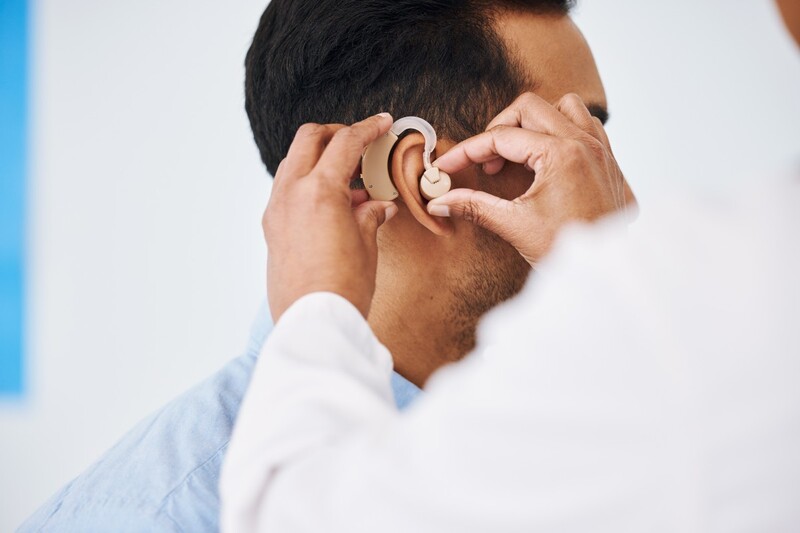Intelligence, community and recognition for pay and reward professionals.
Hear Today, Gone Tomorrow
 Ian Hodson
Ian HodsonWhy employee hearing tests are key to wellbeing, increasing productivity and workplace safety

Following the pandemic, we all spoke of the new norm, we dissected how we would find the balance between time spent in the office and the time spent working from home, and we all adjusted what had become our routine daily habits into changed routines. Whatever scenarios employees found themselves in during and post the pandemic, I think we can safely say that how we are working now, whatever that may be, is the new norm.
Perhaps now is also the time for us to take a look at the settled normalities of everyday activities and reset the factors that operate to support them. Whilst we have become very used to our employer reminding us of the importance of our eyes, and regular tests because of the time we spend looking at display screens there is perhaps a sensory need that is much more reflective of supporting us in our ways of working and the significance of our hearing is often overlooked as part of our employee wellbeing.
Regular hearing tests for employees are a regulatory requirement in many industries where noisy machinery is used but are they perhaps also required as a cornerstone of a healthy, productive workforce and their general wellbeing. If we think about it we have many roles in our organisations with colleagues who spend hours with headphones on, possibly now struggling to be able to cut out the background noise when in busier settings and let’s be honest if we went round asking colleagues when was the last time they had a hearing test, I am sure most would be referencing school. This is why employers are needed to step into this space, not only because of the work requirement but also to educate on the general awareness and education around our hearing.
Here’s why we should all be prioritising hearing tests and how they contribute to the overall positive employee wellbeing in an organisation.
The Growing Concern of Occupational Hearing Loss
Hearing problems can be a sign of one of two things. It could be that there is a problem with the “hardware” of your ears being able to detect noise. As with all hardware problems in life it is possible to get support and we often see this in the form of hearing aids and other noise amplifiers. The second option is that it could be a problem with the “software” which is the brain. This can often mean that the brain is receiving the noise signals but is struggling to process them. is a e to high levels of noise can lead to Noise-Induced Hearing Loss (NIHL), which is irreversible but preventable. Regular hearing tests can identify early signs of hearing loss, enabling timely intervention and preventing further damage.
The Royal National Institute for the Deaf tell us that there is strong evidence to show that:
· hearing is an essential part of brain health.
· mild hearing loss doubles the risk of developing dementia.
· moderate hearing loss leads to three times the risk.
· severe hearing loss increases the risk five times.
But can steps be taken to reduce or avoid this risk? An international review in medical journal The Lancet, published in 2020, suggested that hearing loss is one of twelve key risk factors for dementia that are possibly modifiable (factors that can be changed to reduce dementia risk). The review suggested that one in three cases of dementia could be prevented if more people looked after their hearing health throughout their lives. Unaddressed hearing loss in mid-life was predicted to be the highest potentially modifiable risk factor for developing dementia.
So perhaps know it is worth considering what a programme to support employee awareness and education on the importance of hearing, alongside the facilitation may look like and the benefits regular hearing tests can bring:
Enhanced Safety:
Hearing is crucial for workplace safety. Employees with unaddressed hearing loss may miss important auditory cues, such as alarms, warnings, or the sounds of machinery, increasing the risk of accidents and injuries. Regular hearing assessments ensure that employees can hear and respond to these cues promptly.
Increased Productivity:
Hearing difficulties can lead to misunderstandings, errors, and decreased efficiency. Employees with optimal hearing are more likely to communicate effectively, understand instructions clearly, and perform their tasks accurately. Effective hearing can also increase engagement in discussions and group meetings. This, in turn, boosts overall productivity and engagement levels.
Improved Employee Morale and Retention:
Investing in employees’ wellbeing shows that an organisation values its workforce. This fosters a positive work environment, enhances job satisfaction, and reduces turnover rates. Employees are more likely to stay with an employer who prioritises their well-being as well as awareness that may not only support them but also the wellbeing of their family and friends.
So, what could a comprehensive hearing conservation program look like?
A comprehensive hearing conservation program starts with assessment, includes education and goes beyond just providing hearing tests.
Assessment and Controls: Make sure that there are regular checks on noise levels in the workplace and at home. Organisations such as EarGym also provide online hearing tests that will give an indication to your hearing levels.
Hearing Devices: Make sure you are providing employees with appropriate hearing protection devices and ensure their correct usage through training whether that be headphones to minimise noise or to listen in to work calls.
Education: Educate your employees about the risks of noise exposure, the importance of using appropriate hearing protection and devices and the significance of regular hearing tests.
Facilitate Testing: Work with established employee benefits providers such as Boots or SpecSavers to support making it simple for employees to have hearing tests. Offer financial support to cover the cost of a test and consider supporting the cost of providing support on the cost of devices through a health plan or a workplace adjustment.
So, as we settle into our new normalities, regular hearing tests for employees play a critical role in both supporting us in the delivery of our role and in being an indicator of our general welfare. By prioritising hearing health, employers not only protect their workforce from preventable hearing loss but also may have forever thankful employees if a more significant underlying health condition is picked up early.
Perhaps we will reach a point where we talk about hearing as much as we do our vision as it now sits on an equal standing in terms of ensuring we are well in the workplace.
